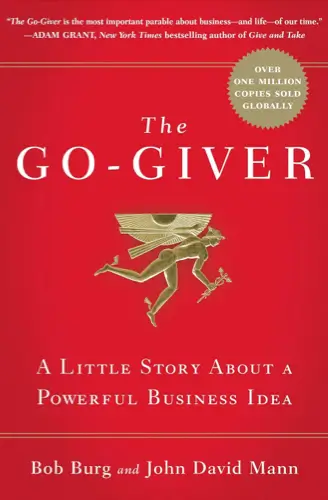The Go-Giver
A Little Story About a Powerful Business Idea
What's it about?
The Go-Giver is an enlightening tale that flips the script on conventional success by suggesting that giving, not getting, is the key to abundant success. Through the journey of a young professional named Joe, this compact yet powerful book unveils Five Laws of Stratospheric Success, revealing how shifting focus from self to others leads to unexpected returns. It's a heartwarming, thought-provoking read that challenges the norms of business and personal growth, making it a must-read for anyone looking to make a meaningful impact in both their professional and personal lives.
About the Author
Bob Burg is a prominent author and speaker, best known for co-authoring "The Go-Giver," a book that explores how giving can lead to professional success. His work emphasizes value, influence, and the power of genuine relationships, advocating for generosity as a cornerstone of effective business and personal growth.
10 Key Ideas of The Go-Giver
Embrace the Law of Value: Deliver More Than Expected
This concept emphasizes providing exceptional value to others, going beyond what is expected.
It's not just about the quality of the product or service but also about the overall experience you provide.
By consistently delivering more value than customers expect, you create a memorable and positive experience that fosters loyalty, repeat business, and referrals.
This approach helps in building strong relationships and a reputable brand image, ultimately contributing to long-term success.
Learn DeeperIdentify Your Unique Value Proposition: Take some time to reflect on what makes your product, service, or personal brand unique. What can you offer that others can't? Once identified, focus on enhancing and communicating this value clearly to your audience.
Exceed Expectations with Small Gestures: It doesn't always have to be grand gestures. Small acts of kindness or going a little above what is expected can make a big difference. This could be as simple as personalized thank-you notes, prompt responses to inquiries, or offering a little extra service without additional charge.
Solicit Feedback and Act on It: Regularly ask your customers or clients for feedback on their experience. Use this information to make improvements and exceed expectations in the future. Showing that you value and act on customer feedback can significantly enhance loyalty and satisfaction.
Educate Instead of Sell: Focus on educating your audience about the value and benefits of your offering, rather than just selling to them. This approach helps build trust and positions you as an authority in your field, making customers more likely to choose you over competitors.
- Example
A coffee shop that remembers regular customers' orders and occasionally offers a free pastry as a thank you for their loyalty, thereby creating a memorable and positive experience.
- Example
A web design agency that delivers projects a few days before the deadline, includes a detailed guide on how to update the website content, and offers a month of free technical support post-launch.
Adopt the Law of Compensation: Your Income is Determined by How Many People You Serve and How Well You Serve Them
This principle suggests that your financial success is directly proportional to how many people you serve and the quality of that service.
Expanding your reach and positively impacting more lives increases your opportunities for compensation.
It encourages focusing on serving others and solving their problems, which in turn, leads to personal and financial growth.
This mindset shift from 'taking' to 'giving' ensures a sustainable business model built on genuine value creation.
Learn DeeperIdentify Your Audience: Start by pinpointing who you can serve best. Understand their needs, challenges, and desires. This understanding will allow you to tailor your services or products to meet their specific requirements.
Enhance Your Service Quality: Continuously seek feedback from those you serve and use it to improve. Whether it's through better customer service, higher quality products, or more valuable content, enhancing how well you serve will increase your impact.
Expand Your Reach: Utilize social media, networking events, and referrals to connect with more people. The more individuals you can serve, the greater your potential income. Consider also online platforms that can help you reach a global audience.
Provide More Value Than Expected: Always look for ways to go above and beyond what's expected. This could mean adding extra features to your products, providing exceptional customer support, or offering helpful resources for free. Surpassing expectations leads to satisfied customers who are likely to recommend your services to others.
Educate Yourself Continuously: Stay informed about your industry, market trends, and ways to improve your service. The more knowledgeable you are, the better you can serve your audience and solve their problems effectively.
- Example
A freelance graphic designer not only delivers the project on time but also provides a guide on how to best utilize the designs for marketing purposes, thereby adding more value to the service.
- Example
A coffee shop owner learns that customers in their area are increasingly interested in sustainable practices, so they switch to compostable cups and locally sourced coffee beans, serving their community's preferences better and attracting more customers.
Implement the Law of Influence: Your Influence is Determined by How Abundantly You Place Other People’s Interests First
Prioritizing others' needs over your own can paradoxically lead to greater personal and professional success.
By genuinely caring for and helping others achieve their goals, you build strong, trust-based relationships.
This selfless approach enhances your influence and reputation, making others more inclined to support and advocate for you in return.
It's about creating a positive impact in the lives of those around you, which ultimately circles back to benefit you.
Learn DeeperListen Actively: Whenever you're in a conversation, focus entirely on the other person. Ask questions to understand their needs and interests better. This shows that you value their perspective and are genuinely interested in them.
Offer Help Without Expecting Anything in Return: If you see an opportunity to assist someone, do it without the anticipation of a favor in return. This could be as simple as sharing a helpful resource or making an introduction to someone in your network who can help with their goals.
Express Gratitude: Regularly acknowledge and appreciate the efforts and contributions of others. A simple 'thank you' can go a long way in making someone feel valued and build a stronger relationship.
Be a Connector: Make it a habit to connect people within your network who could benefit from knowing each other. By being a facilitator of relationships, you not only help others but also increase your value and influence in your network.
- Example
Imagine you're at a networking event and you meet someone looking for a job in your industry. Instead of just offering advice, you take the time to introduce them to a hiring manager you know. This act of kindness could significantly impact their career and they'll likely remember your help.
- Example
You have a colleague who's working on a project that aligns with your expertise. Even though you're busy, you offer to review their work or provide some insights that could improve their project. Your willingness to help, without immediately benefiting from it, strengthens your relationship and sets a foundation for mutual support in the future.
Follow the Law of Authenticity: The Most Valuable Gift You Have to Offer is Yourself
Being authentic means being true to your values, beliefs, and personality in all your interactions.
This authenticity resonates with people, fostering deeper connections and trust.
When you are genuine, people are more likely to engage with and support you because they see and appreciate your realness.
This law encourages embracing your unique qualities and using them to serve others, highlighting that personal touch as a differentiator in the market.
Learn DeeperReflect on Your Core Values: Spend some time thinking about what truly matters to you. What are your non-negotiables in life and work? Writing these down can help you stay aligned with them in your interactions.
Practice Self-Awareness: Regularly check in with yourself to ensure you're being authentic. Ask yourself if your actions and words reflect your true thoughts and feelings. This can be done through journaling or meditation.
Communicate Openly and Honestly: Whether in personal or professional settings, strive to express your thoughts, feelings, and beliefs transparently. This doesn't mean being blunt to the point of rudeness, but rather, being honest in a respectful manner.
Seek Feedback: Ask close friends or trusted colleagues for their honest opinion on whether they perceive you as being authentic. Sometimes, external perspectives can highlight areas we might be unaware of.
Embrace Vulnerability: Being authentic sometimes means showing your vulnerabilities. This doesn't signify weakness but rather builds deeper connections with others who can relate to your experiences.
- Example
A business owner openly shares the story of their humble beginnings and struggles along the way to success, rather than projecting an image of having always been successful. This honesty attracts customers who value resilience and transparency.
- Example
During a job interview, instead of providing rehearsed answers, a candidate speaks genuinely about their experiences, including lessons learned from failures. This authenticity makes them stand out and can lead to a stronger connection with the interviewer.
Uphold the Law of Receptivity: The Key to Effective Giving is to Stay Open to Receiving
While giving is crucial, being open to receiving is equally important.
This principle addresses the balance between giving and receiving, acknowledging that accepting help, opportunities, and even feedback allows for growth and further giving.
It challenges the notion that receiving is selfish, proposing instead that it enables a cycle of generosity by replenishing your ability to give.
Embracing receptivity ensures that giving and receiving are not mutually exclusive but complementary actions.
Learn DeeperPractice gratitude daily: Start or end your day by listing three things you're grateful for. This simple act can shift your mindset to one of receptivity, making you more open to receiving gifts, help, or opportunities that come your way.
Offer help without expecting anything in return: Whether it's professional advice, a listening ear, or a helping hand, give freely. This sets the stage for a natural flow of giving and receiving in your relationships.
Ask for help when you need it: Many of us hesitate to ask for help, fearing it makes us appear weak or burdensome. Challenge this notion by reaching out for assistance when you genuinely need it, whether it's for a work project, personal advice, or support with a task.
Acknowledge and accept compliments: Instead of deflecting compliments, practice saying 'Thank you' and truly accepting them. This small change can help you become more receptive to positive feedback and recognition.
Reflect on barriers to receiving: Take time to consider what might be holding you back from being open to receiving—whether it's pride, fear of obligation, or a belief that you're not deserving. Acknowledging these barriers is the first step to overcoming them.
- Example
Imagine you've been working on a project at work and hit a roadblock. Instead of struggling alone, you reach out to a colleague for their expertise. Not only does this help you move forward with your project, but it also strengthens your relationship with your colleague and sets a precedent for mutual support.
- Example
You receive a compliment from a friend on a meal you've prepared. Instead of brushing it off with a comment like 'It's nothing special,' you accept the compliment with a simple 'Thank you, I'm glad you enjoyed it.' This small act of receiving gracefully can boost your confidence and encourage more positive interactions.
Deeper knowledge. Personal growth. Unlocked.
Unlock this book's key ideas and 15M+ more. Learn with quick, impactful summaries.
Read Full SummarySign up and read for free!
The Go-Giver Summary: Common Questions
Experience Personalized Book Summaries, Today!
Discover a new way to gain knowledge, and save time.
Sign up for our 7-day trial now.
No Credit Card Needed

Similar Books

The Decision Book
Mikael Krogerus
This is Going to Hurt
Adam Kay
The ^AOxford Handbook of Job Loss and Job Search
Ute-Christine Klehe PhD
Job Interviews For Dummies®
Joyce Lain Kennedy
Job Interviews In A Week
Alison Straw
Handbook of Career Development
Gideon Arulmani
The Company She Keeps
Georgia Durante
The Millionaire Fastlane
MJ DeMarco
Losing My Virginity
Richard Branson
Crush It!
Gary VaynerchukTrending Summaries

Peak
Anders Ericsson
Never Split the Difference
Chris Voss
Smart Brevity
Jim VandeHei
The Psychology of Money
Morgan Housel
The First 90 Days
Michael D. Watkins
Atomic Habits
James Clear
Thinking, Fast and Slow
Daniel Kahneman
The Body Keeps the Score
Bessel van der Kolk M.D.
The Power of Regret
Daniel H. Pink
The Compound Effect
Darren HardyNew Books

Comprehensive Casebook of Cognitive Therapy
Frank M. Dattilio
The White Night of St. Petersburg
Michel (Prince of Greece)
Demystifying Climate Models
Andrew Gettelman
The Hobbit
J.R.R. Tolkien
The Decision Book
Mikael Krogerus
The Decision Book: 50 Models for Strategic Thinking
Mikael Krogerus
Fichte
Johann Gottlieb Fichte
Do No Harm
Henry Marsh
This is Going to Hurt
Adam Kay

